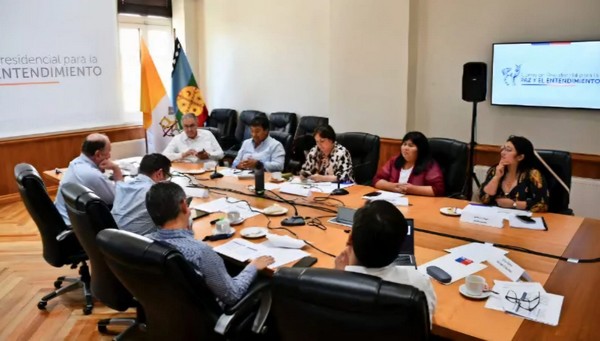Accelerating compensation to Mapuche communities and providing alternatives, such as pensions, housing, or working capital for fields, are some of the options being considered by the commission.
Throughout yesterday, at the Menchaca Lira campus of UC Temuco, the 52nd session—and the fourth in the capital of La Araucanía—of the Commission for Peace and Understanding took place, one of the last before delivering its final report to President Gabriel Boric on January 30.
The executive secretary of the commission, Víctor Ramos, highlighted the work that "the eight commissioners are seriously carrying out." He added that, in the final stage, they continue "intensely seeking agreements and positions that allow offering the country a way out of the problem mandated by the presidential decree and all political forces," though he acknowledged that "it is a difficult issue," and that, after 19 months since its formation, they are still seeking "to reach some common position."
Senator and co-chair of the commission, Francisco Huenchumilla (DC), stated that they are "in the final stretch" of their work as commissioners, which is why, exceptionally, they will hold sessions in Santiago on Mondays, Thursdays, and Fridays in the coming weeks, "to see if we can reach an agreement between the Mapuche community, farmers, and forestry companies."
He added that "this has not been easy; we are at a critical point."
CONADI and Land Purchases
During the previous session, some commissioners participated in the Senate Agriculture Committee meeting, where rural violence and the potential purchase of productive lands claimed by Mapuche communities were among the topics discussed.
Senator for La Araucanía, Carmen Gloria Aravena (Republican Party), argued that the work carried out by the National Corporation for Indigenous Development (CONADI) in acquiring and delivering lands to Mapuche communities has been deficient.
"Currently, it is projected to take roughly 100 years to deliver all the lands committed by the State. What we want (as commissioners) is to deliver them in 10 (years)." She added that this requires "a change in the (land) law to avoid further increasing this state debt."
In a letter sent to its members, fellow commissioner and president of the Malleco Farmers' Association, Sebastián Naveillán, agreed that "any reparation, when documented, must offer viable alternatives, including financial compensation, without affecting productive lands."
In the document, Naveillán warned that "our country cannot afford productive fields becoming unproductive or abandoned. The risk of delivered lands not being worked affects the economy, employment, and ultimately, Chile's food security."
Source: El Mercurio







Comentarios (0)
No hay comentarios aún. ¡Sé el primero en comentar!
Deja un comentario